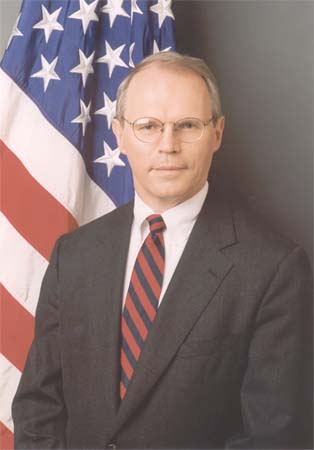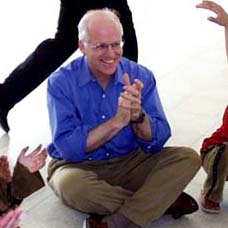
On Sept. 19, 2005, North Korea signed a widely heralded denuclearization agreement with the United States, China, Russia, Japan and South Korea. Pyongyang pledged to "abandon all nuclear weapons and existing nuclear programs." In return, Washington agreed that the United States and North Korea would "respect each other's sovereignty, exist peacefully together and take steps to normalize their relations." Four days later, the U.S. Treasury Department imposed sweeping financial sanctions against North Korea designed to cut off the country's access to the international banking system, branding it a "criminal state" guilty of counterfeiting, money laundering and trafficking in weapons of mass destruction. The Bush administration says that this sequence of events was a coincidence.
Whatever the truth, I found on a recent trip to Pyongyang that North Korean leaders view the financial sanctions as the cutting edge of a calculated effort by dominant elements in the administration to undercut the Sept. 19 accord, squeeze the Kim Jong Il regime and eventually force its collapse. My conversations made clear that North Korea's missile tests in July and its threat last week to conduct a nuclear test explosion at an unspecified date "in the future" were directly provoked by the U.S. sanctions. In North Korean eyes, pressure must be met with pressure to maintain national honor and, hopefully, to jump-start new bilateral negotiations with Washington that could ease the financial squeeze. When I warned against a nuclear test, saying that it would only strengthen opponents of negotiations in Washington, several top officials replied that "soft" tactics had not worked and they had nothing to lose.
The chief U.S. negotiator, Christopher Hill (RPCV Cameroon), faced strong opposition from key members of his own delegation at every step of the way when North Korea signed a widely heralded denuclearization agreement with the United States, China, Russia, Japan and South Korea on Sept. 19, 2005
North Korea: A Nuclear Threat
Is Kim Jong Il ready to provoke a regional crisis? An exclusive account of what Pyongyang really wants.
North Korea is hurtling toward a confrontation with the United States
By Selig S. Harrison
Newsweek International
Oct. 16, 2006 issue - On Sept. 19, 2005, North Korea signed a widely heralded denuclearization agreement with the United States, China, Russia, Japan and South Korea. Pyongyang pledged to "abandon all nuclear weapons and existing nuclear programs." In return, Washington agreed that the United States and North Korea would "respect each other's sovereignty, exist peacefully together and take steps to normalize their relations."
Four days later, the U.S. Treasury Department imposed sweeping financial sanctions against North Korea designed to cut off the country's access to the international banking system, branding it a "criminal state" guilty of counterfeiting, money laundering and trafficking in weapons of mass destruction.
The Bush administration says that this sequence of events was a coincidence. Whatever the truth, I found on a recent trip to Pyongyang that North Korean leaders view the financial sanctions as the cutting edge of a calculated effort by dominant elements in the administration to undercut the Sept. 19 accord, squeeze the Kim Jong Il regime and eventually force its collapse. My conversations made clear that North Korea's missile tests in July and its threat last week to conduct a nuclear test explosion at an unspecified date "in the future" were directly provoked by the U.S. sanctions. In North Korean eyes, pressure must be met with pressure to maintain national honor and, hopefully, to jump-start new bilateral negotiations with Washington that could ease the financial squeeze. When I warned against a nuclear test, saying that it would only strengthen opponents of negotiations in Washington, several top officials replied that "soft" tactics had not worked and they had nothing to lose.
It was no secret to journalists covering the September 2005 negotiations, or to the North Koreans, that the agreement was bitterly controversial within the administration and represented a victory for State Department advocates of a conciliatory approach to North Korea over proponents of "regime change" in Pyongyang. The chief U.S. negotiator, Christopher Hill, faced strong opposition from key members of his own delegation at every step of the way.
It was particularly galling to Victor Cha, director for Asian Affairs in the National Security Council and to Richard Lawless, assistant secretary of Defense, that Hill agreed to conduct intensive bilateral negotiations with North Korea in Beijing prior to the six-party talks. In their eyes, bilateral talks amount to implicit diplomatic recognition, and the "steps to normalize relations" envisaged in the agreement would legitimize a rogue regime. When Hill hosted a dinner in Beijing for the chief North Korean negotiator, Vice Foreign Minister Kim Gye Gwan, Cha and Lawless refused to attend. When a draft agreement was finalized, they held up final agreement for three days, unsuccessfully attempting to get the White House to insist on tougher terms. The issue was finally resolved only when China insisted on sticking to the draft agreement.
During six hours of intensive give-and-take with Kim Gye Gwan, both in his office and in two one-on-one dinners with only an interpreter present, he said over and over to me, "How can you expect us to return to negotiations when it's clear your administration is paralyzed by divisions between those who hate us and those who want to negotiate seriously? At the very time when we were engaged in such a long dialogue last year, your side was planning for sanctions. Cheney did this to prevent further dialogue that would lead to peaceful coexistence. So many of your leaders, even the president, have talked about regime change. We have concluded that your administration is dysfunctional."
At one point in our farewell dinner on Sept. 22, Kim leaned forward and made a pointed comment that clearly foreshadowed the Foreign Ministry's threat to conduct a nuclear test. "We really want to coexist with the United States peacefully," he said, "but you must learn to coexist with a North Korea that has nuclear weapons. You have learned to live with other nuclear powers, so why not us?" I replied, "That doesn't sound like you are really committed to denuclearization." "You misunderstand me," he said. "We are definitely prepared to carry out the Sept. 19 agreement, step by step, but we won't completely and finally dismantle our nuclear weapons program until our relations with the United States are fully normalized. That will take some time, and until we reach the final target, we should find a way to coexist."
North Korea is divided between hawks who favor nuclear weapons and pragmatists who are pushing for economic reforms and a denuclearization deal with the United States. Just as the engagement policy pursued by the Clinton administration strengthened the pragmatists, so the Bush shift to a regime-change policy has given the initiative to the hawks.
The financial sanctions are very severe. The United States has in effect asked all banks in the world not to deal with North Korea or to handle any transactions involving the country. The Bush administration says that it is enforcing laws against money laundering and counterfeiting, and seeking to stop transactions relating to weapons of mass destruction. But statements by Treasury Department officials have made clear that the goal is to cut off all North Korean financial intercourse with the rest of the world.
Undersecretary of the Treasury Stuart Levey told The Wall Street Journal on Aug. 23: "The U.S. continues to encourage financial institutions to carefully assess the risk of holding any North Korea-related accounts." I found instances in North Korea—confirmed by foreign businessmen and foreign embassies—in which legitimate imports of equipment for light industries making consumer goods have been blocked because banks would not handle the transactions. "If the U.S. is not ready to lift all of the financial sanctions, all at once," Foreign Minister Paik Nam Soon said, "then it should show us in other ways that it is ready to give up the regime-change policy."
Kim Gye Gwan spelled out what Pyongyang has in mind, calling for bilateral negotiations without preconditions leading to a package deal that would be followed by the resumption of the six-party talks. For example, he indicated, the U.S. would lift some or all of the sanctions in return for North Korean concessions such as a cessation of plutonium production at the Yongbyon reactor; a missile-test moratorium, or a commitment not to transfer nuclear weapons or fissile materials to third parties. Or Washington would offer incentives—such as energy aid and removal of North Korea from the State Department list of terrorist states—in return for a North Korean compromise on aspects of the financial sanctions, to be negotiated.
How much are the sanctions hurting? In Pyongyang's view, they are seriously impeding North Korean efforts to carry out economic reforms, because they are blocking foreign investment and trade. They are slowing down economic growth. But there is no sign whatsoever that the sanctions are undermining the Kim Jong Il regime.
North Korea is stable and there is more economic activity in Pyongyang than I have ever seen—more cars and bicycles, better-dressed people, more restaurants, more small mom and pop stores, and above all more interest in making money. That's the result of reform policies that give more autonomy and profit incentives to economic enterprises. Everything is still formally owned by the state, but enterprises are leased to managers who pay less to the state than they used to and can keep much more if they make a profit.
In contrast to Pyongyang, the countryside is stagnant and impoverished in many areas. But this has not affected the political stability of the regime. The belief that regime change is possible is rooted in the assumption that North Korea is an economic basket case. But the country does have significant natural resources like gold, iron ore and potential seabed oil and gas reserves.
China is a hot-button subject in Pyongyang. All of the seven officials I met, including Foreign Minister Paik Nam Soon and Vice President Kim Yong Dae, changed the subject when I asked about trade and investment relations with China or Beijing's pressure not to conduct a nuclear test. Significantly, however, several of them, speaking off the record, pointed to North Korea's "strategic geopolitical location" and emphasized that Pyongyang wanted close ties with the United States, a faraway power, to offset pressures from its neighbors. "It would be good for the United States," one of them said, "to have us as a neutral buffer state in this dangerous area. Who knows, perhaps there are ways in which the United States could benefit from our ports and our intelligence if we become friends."
South Korea, like North Korea, sees the United States as a counterweight to its powerful neighbors. In my view, long-term U.S. strategic interests would be served by an end to the sanctions policy, coexistence with the Kim Jong Il regime in return for its denuclearization and support for Seoul's conciliatory approach to Pyongyang as the prelude to a North-South confederation and, in time, a unified Korea.
Selig S. Harrison, who just returned from his 10th visit to North Korea, is director of the Asia Program at the Center for International Policy in Washington.
© 2006 Newsweek, Inc.
















